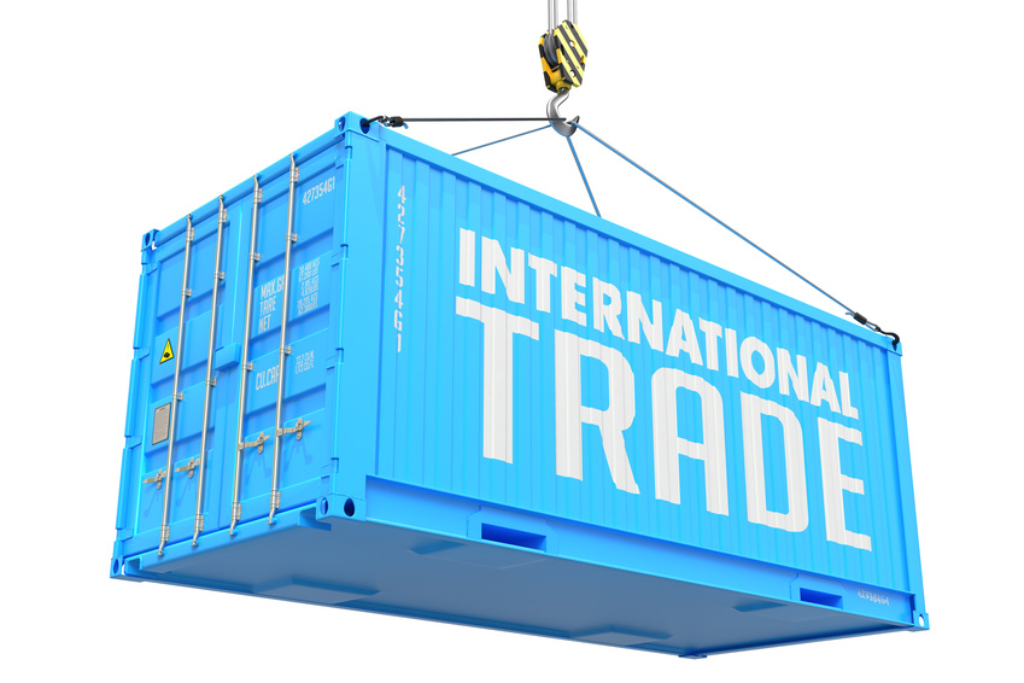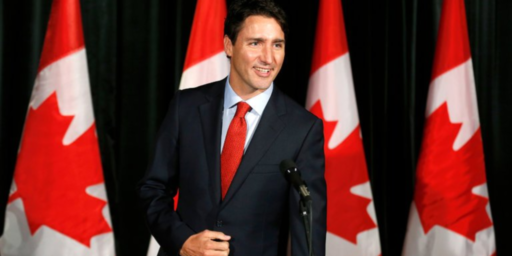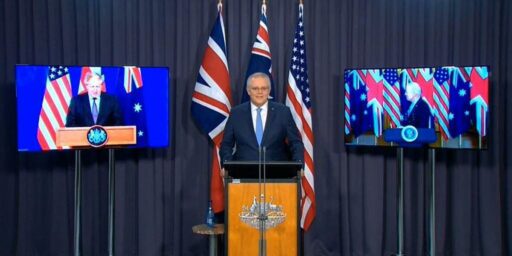Trade Isolation and the Lack of Winning
The TPP is about to go into effect without the US.
 Via CNN: Trump pulled out of a massive trade deal. Now 11 countries are going ahead without the US.
Via CNN: Trump pulled out of a massive trade deal. Now 11 countries are going ahead without the US.
A major 11-country agreement goes into effect Sunday, reshaping trade rules among economic powerhouses like Japan, Canada, Mexico and Australia — but the United States won’t be a part of it.
That means that Welch’s grape juice, Tyson’s pork and California almonds will remain subject to tariffs in Japan, for example, while competitors’ products from countries participating in the new Comprehensive and Progressive Agreement for Trans-Pacific Partnership will eventually be duty-free.
Japan will offer similar tariff relief to the European Union, in a separate trade deal set to go into effect on February 1.
“Our competitors in Australia and Canada will now benefit from those provisions, as US farmers watch helplessly,” said US Wheat Associates President Vince Peterson at a hearing on the potential negotiations with Japan.
Via the APP (Australian Associate Press): US farmers ‘helpless’ as TPP boosts Aust
American farmers are facing the “imminent collapse” of key markets and fear uneven trade playing fields as Australian, Canadian and other rival nations take advantage of the soon-to-be implemented Trans-Pacific Partnership.
After President Donald Trump withdrew the US from the TPP on just his third day in the White House in 2017, the States will be left on the sidelines when the re-shaped TPP-11 comes into effect 12am on Sunday AEDT.
Australia, Canada, Japan, Mexico, New Zealand and Singapore were the first nations to ratify the agreement, formally titled the Comprehensive and Progressive Agreement. Vietnam, Chile, Brunei, Peru and Malaysia are set to follow in coming months
US farmers, already hit hard by Trump’s tariff battle with China and the lack of a free trade agreement with Japan, are bracing to immediately lose market share.
[…]
“Japan is generally a market where we seek to maintain our strong 53 per cent market share, but today we face an imminent collapse,” US Wheat Associates President Vince Peterson told a public hearing held by the US Trade Representative earlier this month.
“Frankly, this is because of provisions negotiated by (former US president Barack Obama’s administration) for our benefit under the Trans-Pacific Partnership.
“Our competitors in Australia and Canada will now benefit from those provisions, as US farmers watch helplessly.”
Peterson said Australian and Canadian wheat producers will enjoy an immediate seven per cent drop in tariffs selling to Japan because of the TPP-11.
“By April it will have gone down by 12 per cent,” he said.
“In very real terms, as of April 1, 2019, US wheat will face a 40 cent per bushel, or $US14 per metric tonne, resale price disadvantage to Australia and Canada.
“After nine years the US will face an automatic premium of $US70 per tonne.
“But by that time most of the market will be long gone.”
The reality is that the “America First” rhetoric and approach by the current administration is really one that puts America well behind competitors. We exist, whether we like it or not, in a global economy and that creates parameters and constraints that we cannot just ignore it or will it away. If the above situation persists, along with the burgeoning trade war with the Chinese and others, then there will be substantially negative consequences to American agribusiness and the economy writ large.
Trump has a simpleton’s understanding of trade and economy. He does not understand what the trade deficit is, nor does he really understand negotiations (which usually boils down to: I will take my ball and go home if you don’t play by my rules). I know that many, including some readers here, think of him as a major business success and deal-maker extraordinaire, but how hard is it to make deals with contracts and sub-contractors when you you can stiff them and then use the fact that they cannot afford to go to court to your advantage? Trump clearly has a con-man’s ability to sell things, but where is the evidence of massive, mind-blowing deal-making?* There is certainly no evidence of understanding complex systems.
And, yes, I know that Hillary Clinton talked about pulling out of the TPP as well, which I thought was foolish. I am pretty sure, had she been elected, that there would not have been an immediate withdrawal, and there likely would have been some show of renegotiation to allow us to continue in the deal. If not, I would have been criticizing her choice. I recognize that free trade deals like the TPP are not cost free. I recognize that globalization has a down-side, but Trump’s notion of just pouting on the sideline and allowing US farmers, who rely heavily on exporting their product to be shut out of market share does not strike me is good deal-making nor a particularly useful manifestation of “America First.”
*And really, how hard would have been to be successful with the financial backing he received from his father, which we now know was far more than a $1 million loan? Not to mention that when we talk about “successful” we are talking about a man with multiple bankruptcies (that, again, would have been worse with money from his father). Trump’s reputation was built going on TV and radio back in the 1980s (Letterman and Stern) and was built of late on The Apprentice.
I remember watching Trump on Letterman and never being quite sure if Trump was in on the fact that he was a bit of joke. I think he kind of got it, but also just enjoyed the attention.
See, the NYT: Trump Engaged in Suspect Tax Schemes as He Reaped Riches From His Father and 11 Takeaways From The Times’s Investigation Into Trump’s Wealth. I would also recommend this episode of the The Daily podcast: How Trump Really got Rich.
See, also, a new piece in the the New Yorker: How Mark Burnett Resurrected Donald Trump as an Icon of American Success.






To be honest, that’s what I expected Dennison would do.
Not that I thought him smart enough to realize this on his own. But I also didn’t think him stupid enough not to listen to advise. I was wrong.
It’s the same hubristic error made by the British voters with Brexit. We, like the Brits, surrendered leverage while demanding new negotiations. Said negotiations did not go well to the surprise of no one who’d actually thought about it realistically.
In both cases the metric people used in their decision-making was resentment born out of a false sense of victimization. Self-pity is not the basis for successful negotiation. The relevant metric is power. (It usually is.) The consistent thing about Trump is that he doesn’t get power. He gets bullying, but not power. So he played the bully boy on TPP and surrendered power. Less power does not lead to better negotiating outcome. The idea is to negotiate from strength.
Duh.
Chaser:
Lots of red herrings here.
The fact is, we have managed trade, not free trade. And you might want to cite the winners, and not just the losers in trade policy, but that would require a balanced assessment.
A non-simpleton treatment of this issue would deal with those harmed and helped by managed trade, and would attempt to assess the extremely difficult and morally significant issue of the US consumer who benefits from cheap imports vs the US employee harmed by cheap, managed and subsidized imports.
But then, why give up a cheesy TDS post when it gets the bar room crowd going………..
@Guarneri:
The trade deficit continues to increase. I thought that was supposed to be the problem. So why is the trade deficit growing? An objective person might suspect that Trump’s ‘policy’ isn’t working.
The trade deficit expands, the budget deficit and national debt increase, and if this were Obama you’d be apoplectic. But it’s your cult leader so it’s all swell, and all you need to do is accuse Steven Taylor of being superficial by writing your own superficial comment and accusing others of having your disease.
@Guarneri: I agree with much of what you’re said. “Free” trade like “free” markets exist in theoretical constructs that we use to help us understand, not in reality. I was against the original TPP because it excluded China and it didn’t make sense to me to create something that didn’t contain an important trade partner. We should analyze in a dispassionate fashion the outcomes from the changes in our trade policies. I am sure that we can find areas where the changes have benefited specific groups and where some groups have been hurt. The concerns of the wheat growing group strikes a chord with me. Agriculture has been an area where the USA has been a world leader. I recognized that Detroit and Eighth Avenue were vulnerable to competition, but I thought Iowa was safe. If we give up agriculture, what’s left?
@Slugger:
This was literally one of the most important purposes of the TPP. China wanted to negotiate with each country individually since they were economically stronger. The TPP is meant to counterbalance that strength.
@Guarneri: You should be writing a blog about this issue. Of course, if you started writing a blog, the readers would quickly discover that, much like others both inside and outside of global business, you really only understand the boilerplate pontifications that nearly anyone (including an ignint cracker such as myself) can make.
I guess it’s not such a good idea after all.
@Slugger:
Why?? Because we happen to a world leader in it right now, you just assumed that would continue and be “safe”? This right here is why we’re getting our asses kicked – resting on our laurels. America’s spent so long thinking “We’re #1”, we slide down in the rankings and never noticed. This is not a post world war ravaged world were we were the only one left standing anymore.
Let’s make this perfectly clear: in a real free market, there’s. no. such. thing. as. safe!!
There’s plenty of land out there to farm with plenty of arable land. Why would you think we wouldn’t get challenged by an up and coming country that’s gotten its hands on better tech? China alone has enough space to be a serious challenge if they put their mind to it. Also, why would you expect them to depend on an unstable trading partner like ourselves instead of trying to be self-sufficient? China can pay Brazil to bulldoze some rainforest and get their crops rather then dealing with Donald and Brazil’s thrilled to get more stable trade.
We need to get it through our thick heads: the world doesn’t need us. Yeah, we can hurt it bad by not playing but if the US ceased to exist as a market overnight, the global economy would course-correct. If we persist in acting like we’re the only game in town, we’re gonna find ourselves the only ones left in town.
Not sure I ever bought that. Hillary knew her supporters wouldn’t hold it against her if she reneged on that particular “promise.”
@Guarneri:
I concur that every deal has winners and losers. I would be happy to hear who you think the winners are, domestically, in this situation.
My general assessment is that such isolating deals, historically, tend not to be good for an economy.
So, what’s the upside that I am missing?
@Stormy Dragon: I meant to mention that, actually. Is he going to try and cover these loses also?
@Slugger: It is certainly the case that “free” trade is an over-simplification.
But I agree with MM: not including China was part of the purpose–although leaving room for them to join later.
@Slugger: I would also note: no market is purely free, if free means no constraints, no regulations, etc.
@KM: Long term, I wouldn’t sweat the tariffs. Iowa and the rest of the farm belt are a unique combination of soil and climate. Thanks to Trump, but more to the whole Republican Party kowtowing to the Kochs, we’re removing the climate part of the combination.
@Guarneri:
That’s the problem, the consumer and employee are the same people.
@Andre Kenji de Sousa: Yup.
@gVOR08: Ouch!
@Steven L. Taylor: There are 2 kinds of markets: Regulated markets and captured markets. A free market is just a step up the road from captured.
Steven, two of the links at the end of your post need fixing.
@OzarkHillbilly: My T-Party inclined Sis and I were having this conversation. She is (or actually – was, she’s a Trumper today) for un-regulated markets. I told her that a ‘free market’ is a mental exercise that actually does not exist except for the very brief time it takes someone to corner it. After that, SOMEONE regulates every market. The true question is: Who do you want that person to be?
Huh! When I read the Original Post I’d meant to comment on this: We see how stupid our President and his party are by his threat to close the Mexican-US border with the remark that it will save the US money. Because we have a trade deficit. So not trading will make us rich.
Mr Guano will explain that to us any minute.
@Michael Reynolds: Self-pity is never a good basis for ANYTHING.
I’m ranting now, but I have a friend who has gone down the far-right rabbit hole. For the past several years he has been whining incessantly about how everything that goes wrong with his life is due to the fact that he is a white, middle-aged male and how everyone is discriminating against him. Have often thought “it’s easier for people to allow you to draw that conclusion rather than tell you the truth–which is that you have a huge chip on your shoulder and a complaining demeanour, which puts everybody off.” (I do have to admit that maybe he’s better with other people and reserves his complaining for me–which is one reason why I’ve been talking with him less and less.)
Self-pity ain’t pretty, guys. It also sabotages your abilities to notice possibilities. Besides, who wants to be around a whiner?
@Kit: Thanks for noting that–I have now fixed them.
Free Market does not mean unregulated markets – that’s a red herring from the Right. It means trying to expand trade with safety and proper(not excessive) regulation. The problem is that consumers and employees are basically the same people, and that’s a huge problem when people talk about “losers” of globalization.
That brings huge challenges, but trying to solve these challenges by simply closing markets – take out trade with China and the “losers of globalization”(tm) can’t buy flat screen TVs on Wal-Mart.
Everyone who is surprised that @Guarneri did not avail himself of the invitation to name the ‘winners’ in Trump’s trade war, raise your hand. Anyone?
@grumpy realist:
Ask your friend this: If you could press a button and make yourself a black man, would you? I predict hemming, hawing, toe-digging, shoulder-shrugging and a lot of looking at the floor.
Haha
https://theconservativetreehouse.com/2018/12/30/canadian-media-tries-to-find-benefits-from-joining-tpp-agreement/#comments
Haha. Newsweek is reporting that New Jersey’s attorney general has evidence that Trump’s golf club gave its undocumented workers fake green cards and social security numbers.
it’s pretty clear why Trump was freaked out the night he won the election. Basically everything he’s ever been involved in is criminal. Mueller could probably go on longer than the Whitewater investigation if he wanted.
@Michael Reynolds:
It is shocking, to be sure.
There is a club of commenters who drop in, leave a dissenting comment sans evidence for their position (and that are often directly insulting), but never come back to the discussion. Call it the “MBunge Maneuver”
Trump is a moron, and therefore he has the same misconception about trade agreements that many ignorant people have: that there is a “winning” and a “losing” side. Even a moments thought shows that makes no sense whatsoever. Ask yourself: if a one side is losing, why sign at all? If you come out worse for having the agreement nothing could be simpler than not having it in the first place. And if a skeevy partner tricks you into something bad for you, you are going to look to get out of it or sabotage it, so it doesn’t even benefit the “victor” for long.
A trade agreement is a) a way to de-escalate a trade war and let both sides maximize their inherent advantages, and b) a way for the signing parties to gain strength-in-numbers against other countries. And a trade agreement is rarely “free trade” even when it is called that. Rather, the participants usually trade off industries they feel they must protect. “If you give me sugar cane, I’ll accept finished shirts.” “If you reduce import tariffs on sedans to 10% I’ll allow beef imports at the lowest tariff we have with anyone else.”
But Trump is right not to trust any trade deal he had a hand in. Aside from the fact that he literally can’t imagine a deal that doesn’t have a winner and a loser, he is a simpleton who throughout his career has been played by those smarter and tougher than him. There are good reasons Trump was run out of the real estate development market years ago and now exists in the branding space: he’s stupid and weak and gets played like a chump.
@MarkedMan: Well that wasn’t very nice. Truthful, but still, not nice. Is it any wonder that Trump hates guys like you, going around saying unkind truths like that. Tsk. Tsk.
@Michael Reynolds:
Rather than a false sense of victimhood, I’d say it was made out of a false sense of strength in both cases.
But then again perhaps it was both.
You’d expect free trade between countries to be the same as free trade between states or provinces within a country. Goods from California are not charged a tariff when shipped to New York, nor do they have to pass through customs.
Largely this is not the case in trade between countries with “free” trade agreements. Tariffs may remain (though they tend to be low), there are limits on some goods, they are inspected in customs, there are origin content rules, etc.
But there is a massive difference between hat and trade without agreements, even through the WTO. I remember trade in Mexico before it joined the GATT (the precursor to the WTO) in 1986 or so.
To begin with, some imports were outright forbidden, or reserved to certain companies or government agencies. A notable example of this is paper and in particular newsprint. Only one government agency could import newsprint. This allowed the government to practice censorship of the press without calling it censorship.
All other imports were charged a very high import tax, a tariff,, whether they competed with domestic products or not. For example, though many US, Asian and European manufacturers had car assembly plants in Mexico, they used many imported parts, which were not produced domestically. These parts were taxed on importation, and car prices were higher then.
So, sure, NAFTA may not be “free trade,” but it’s a lot better than what came before.
The other thing is that Republicans are not, and have never been, for full free trade internationally.
One component of trade is the free movement of people, not just goods and capital, between borders. After all, an employer should have the right to hire the people they want to hire, right? And employees should have the right to offer their services to all prospective employers, right?
Oh, but place an international border between employer and employee, and the republicans can’t pile on enough onerous regulations on that trade.
@Kathy: ehh… be fair Kathy, those regulations are only for the purpose of keeping the cost of that labor as close to free as possible. It’s all in support of free trade and free labor.